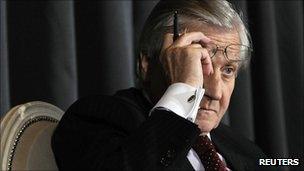ECB told Italy to make budget cuts
- Published

Not all the reforms wanted by ECB president Jean-Claude Trichet were introduced
The European Central Bank told Italy to make sweeping changes to its labour laws and take tough action to cut the deficit, a leaked letter has shown.
In the letter, sent to prime minister Silvio Berlusconi in August, the ECB said the severity of Italy's economic situation made "bold and immediate" action "essential".
The ECB said its list of demands should be enacted by the end of September.
The letter was published in the Italian media on Thursday.
Dated 5 August, the letter came from ECB president Jean-Claude Trichet and his designated successor, Bank of Italy Governor Mario Draghi.
In unusually clear language, the signatories told Mr Berlusconi to make deep reforms, including opening up public services and overhauling pay bargaining and hiring and firing rules.
The ECB called for "pressing action", "essential to restore the confidence of investors" as markets panicked over fears that Italy could be the next country to succumb to the eurozone debt crisis.
Days after the letter was sent, the ECB began its controversial programme to buy Italian bonds, a move aimed at reducing the country's borrowing costs.
The ECB has always rejected suggestions that its bond-buying programme was linked to demands for austerity cuts.
The letter, published in Corriere della Sera, external, said Italy should aim to bring the deficit down to 1% of gross domestic product by 2012 and balance the budget by 2013, a year ahead of schedule, "mainly via expenditure cuts".
It said: "In view of the severity of the current financial market situation, we regard as crucial that all actions listed" be ratified by 30 September.
"We trust the government will take all the appropriate actions," it ends.
The Italian parliament passed a 60bn-euro austerity package earlier this month.
'Eye-watering' costs
While some tax and budget changes were introduced, others, including pay and pension reforms, were implemented either partially or not at all.
On Thursday, opposition parties in Italy said the disclosure of the letter proved that Mr Berlusconi had placed Italy under the "trusteeship" of the ECB.
The ECB's bond-buying programme has as yet failed to dent Italy's borrowing costs.
On Thursday the central bank sold 6.9bn euros of bonds, but at sharply higher interest rates. The yield on the 10-year bonds rose to 5.86%, up from 5.22% last month.
David Schnautz, rate strategist at Commerzbank, described the yield as "eye-watering".
He said: "Obviously it's not a comfortable level on a sustained basis and the headlines don't help. Despite ECB intervention for more than one month Italy is still printing at these levels to get the paper out of the way."